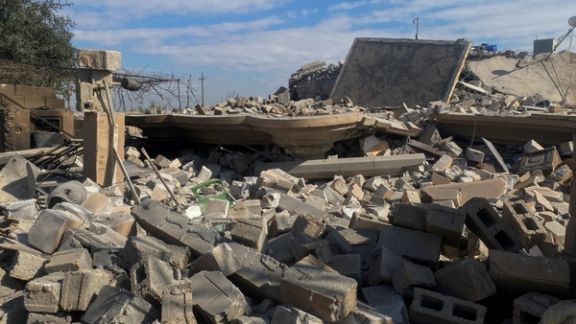Iranian Reactions Portray US Strikes As Inconsequential

Official Iranian statements and media coverage of US airstrikes indicate the concerns about a serious retaliation have dissipated and Tehran can move on with pursuing its regional policies.

Official Iranian statements and media coverage of US airstrikes indicate the concerns about a serious retaliation have dissipated and Tehran can move on with pursuing its regional policies.
On Friday night, the United States hit about 85 targets linked to IRGC Quds Force and affiliated militia groups in Iraq and Syria, but fears of direct US retaliation to the Iran-backed attack in Jordan that killed three US soldiers and wounded scores did not materialize.
The Biden administration after waiting for five days, targeted bases and warehouses belonging to IRGC proxy forces in Syria and Iraq, after multiple reports indicated that these forces evacuated key personnel and perhaps some weapons.
The regime’s reaction to recent US attacks in Iraq and Syria has not exceeded its usual rhetoric of condemnation and accusations against “the enemy.”
Iran’s Foreign Minister Hossein Amir-Abdollahian condemned the attacks on Thursday, saying they stem from Washington’s “continued wrong and failed approach to resolving issues by resorting to force and militarism.”
Earlier in the day, Foreign Ministry Spokesman Nasser Kanaani also dismissed the US offensives as an “adventurous action” and a “strategic mistake,” claiming that they violate international law, the UN Charter, and sovereignty and territorial integrity of Iraq and Syria.
The Iranian currency also somewhat regained its footing, after falling more than 15 percent since early January due to rising regional tensions.
Meanwhile, the Syrian government, Hamas, and Iran-backed Iraqi militant groups Harakat Hezbollah al-Nujaba and Hashd al-Shaabi condemned the attacks as well.
Hamas said the “aggression” was an attempt to “cover up Israel’s horrific crimes” in the Gaza Strip.
The Syrian Foreign Ministry warned that the attacks can “fuel conflict in the Middle East in a very dangerous way.”
Iraqi Prime Minister Mohammed Shia al-Sudani’s office also condemned the airstrikes as a “new aggression against Iraq's sovereignty,” announcing they killed 16 people, including civilians, and injured 25.

The US-led coalition in the region “has become a reason for threatening security and stability in Iraq and a justification for involving Iraq in regional and international conflicts,” the office added.
State-sponsored and military-affiliated news agencies in Iran also covered US operations in Iraq and Syria.
IRGC-affiliated Tasnim news agency reiterated the regime’s rhetoric regarding the incident and even claimed that the Tehran-backed umbrella group, Islamic Resistance in Iraq, carried out a missile attack against Ain al-Asad Air Base in the western province of Anbar, where US forces are stationed. The attack has not yet been confirmed by US officials.
Fars, another IRGC affiliated news agency, published a report titled “‘Belated and Failed Attacks’: Biden Administration under Criticism.”
Citing Roger Wicker, ranking member of the Senate Armed Services Committee, US House Speaker Mike Johnson, and Mike Pompeo, former secretary of state, Fars concluded that the recent US military operations in Iraq and Syria have failed to appease the critics of President Joe Biden, who has been under increasing pressure over the past days to retaliate against Iran and its proxies.
In what can be interpreted as an indirect reaction, IRNA, the Iranian state news agency, reported on Iran’s “defensive and military capabilities.”
Rouydad24, a relatively independent news agency in Iran, tried to distance itself from the mouthpieces of the regime and adopted a more analytical approach.
Rouydad24 conducted an interview with former Iranian lawmaker Heshmatollah Falahatpisheh, who once served as the head of the National Security and Foreign Policy Commission of the Iranian parliament.
Falahatpisheh discussed the “propaganda” objectives of Biden’s administration and stressed that the recent attacks were intended for “domestic consumption” in the US.
Discussing the relationship between Tehran and militant groups in the region, he remarked, “Now it is too late for Iran to say that it is not coordinating with the resistance forces.”
Iran has avoided any direct military involvement in the Israel-Hamas conflict and has instead used its proxy groups such as Houthis and Hezbollah to attack Israeli and American targets in the Middle East. Nonetheless, Iranian officials claim these groups act “independently” and do not receive direct orders from Iran.